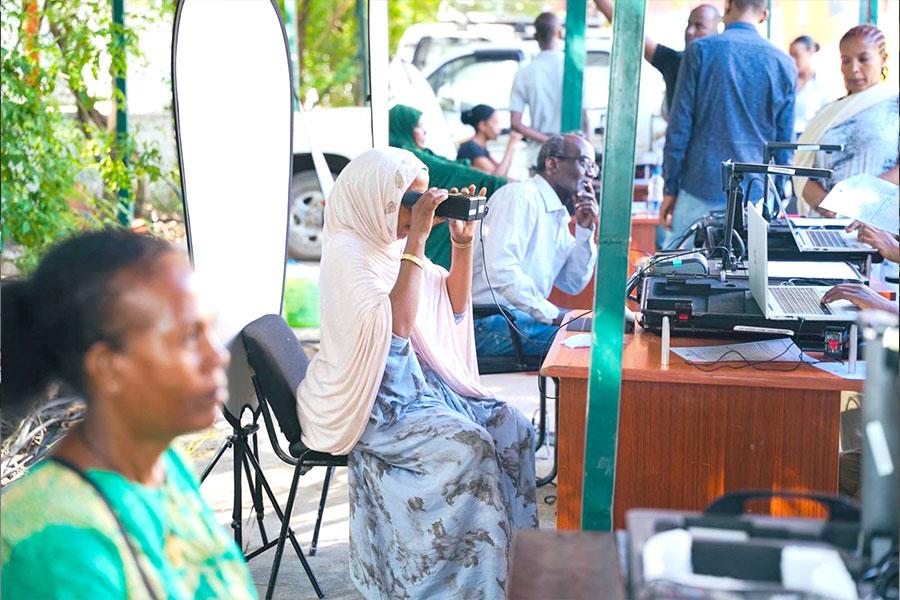
Radar | Jun 11,2022
Nov 27 , 2022
By MUNIR SHEMSU ( FORTUNE STAFF WRITER )
Drivers residing in Addis Abeba will be issued digital licences in the coming year, also serving as transboundary identification cards with microchips storing data on driving history.
An overhaul of the transport and traffic management system, dubbed "Traffic Transport Management System (TTMS)," was initiated with 84 million dollars funded by the World Bank. It is part of a 300 million dollar fund the Bank approved six years ago to finance the Transport Systems Improvement Project Office, managed by Bahru Mossa, who reports to Dagmawit Moges, minister of Transport & Logistics (MoTL).
The project aims to reduce traffic accidents by digitising the system and integrating vehicle and driver data under the tripartite transit and transport facilitation program (TTTFP). Ethiopia is a signatory to the program, an agreement between countries of the Common Market for Eastern & South Africa (COMESA), the South African Development Community (SADC) and the East African Community (EAC).
The Sub-Saharan transport program includes 26 African countries and aims to harmonise cross-border travel. It initially received 18 million euros from the European Union at the end of 2019. The standard of vehicle registration will be harmonised between member countries while enforcing rules at cross-border corridors.
The new driving licence regime will require biometric data such as fingerprints and facial recognition features.
The traffic transport management system will register vehicle numbers to make the car's weight against the roads' capacity across member states as cars enter borders. Vehicles will be identified with a backlog of weight, accident history, penalties and insurance claims that other member states can access beginning the first quarter of 2023.
Director of the Federal Transport Management Training Institute, Ablolom Weldemariam, believes the new regime will address the problem of widespread forgery in driver's licenses.
The registration begins when individuals go to driving schools to get a licence with a unique marker encoded onto microchips attached to the cards assigned to each student. The initial stage will store the hours in driving schools and test scores, including drivers' data. Data on penalties, accident history and vehicles registered under the individual after licences are issued will be recorded.
Debebe Tenaw has been a manager at the Safety Driving School, one of the 103 driving centres in business for nearly two decades. He applauded the infusion of technology into the transport system but warned against it becoming another tool of corruption. The camera malfunctions force the examination date of students to be postponed for up to six months, only to be delivered with bribes, he claimed.
"I'm tired of hearing 'there is no system' excuses," he told Fortune.
Debebe believes the project should start from the regional states and make its way to the capital, claiming most falsified licences originate from regional towns.
Digitisation deprives corrupt officials of room to exploit their positions of power, according to the computer science lecturer Henok Ephrem. The founder of the software company, Tontetor Plc, Henok welcomed the news, arguing that the benefits of such a system trump privacy concerns.
Data collected through the system will be fed into the national ID as part of the digital strategy. Traffic police officers can access drivers' data from a smartphone or laptop.
"The days when the traffic officer pulls down his glasses to match the driver to the picture will be over," said Bahru.
The idea also floated nicely to Birhanu Kuma, communications head of the Addis Abeba Traffic Management Bureau. He believes that the system ultimately helps to lower road traffic accidents. With Ethiopia ranking 19th globally in car fatalities, according to this year's WHO report, a decline in the number of ill-trained drivers on the roads would be a positive development.
Dejene Luche is president of the Ethiopian Transport Employers' Federation, a lobby group for cross-border vehicles with 350 members.
"We're asked to pay as much as 1.3 million Br for crane services when our cars break down in Djibouti," he said.
The Federation welcomes any manner of implementing an integrated cross-border driving management system, according to Dejene. However, he stresses that laws across regional states are not enforced, let alone across borders.
PUBLISHED ON
Nov 27,2022 [ VOL
23 , NO
1179]

Fortune News | Sep 19,2020

Fortune News | Nov 06,2021

Radar | Mar 13,2021

Fortune News | Apr 26,2025

Fortune News | Dec 08,2024

Dec 22 , 2024 . By TIZITA SHEWAFERAW
Charged with transforming colossal state-owned enterprises into modern and competitiv...

Aug 18 , 2024 . By AKSAH ITALO
Although predictable Yonas Zerihun's job in the ride-hailing service is not immune to...

Jul 28 , 2024 . By TIZITA SHEWAFERAW
Unhabitual, perhaps too many, Samuel Gebreyohannes, 38, used to occasionally enjoy a couple of beers at breakfast. However, he recently swit...

Jul 13 , 2024 . By AKSAH ITALO
Investors who rely on tractors, trucks, and field vehicles for commuting, transporting commodities, and f...

Jul 5 , 2025
Six years ago, Ethiopia was the darling of international liberal commentators. A year...

Jun 28 , 2025
Meseret Damtie, the assertive auditor general, has never been shy about naming names...

Jun 21 , 2025
A well-worn adage says, “Budget is not destiny, but it is direction.” Examining t...

Jun 14 , 2025
Yet again, the Horn of Africa is bracing for trouble. A region already frayed by wars...